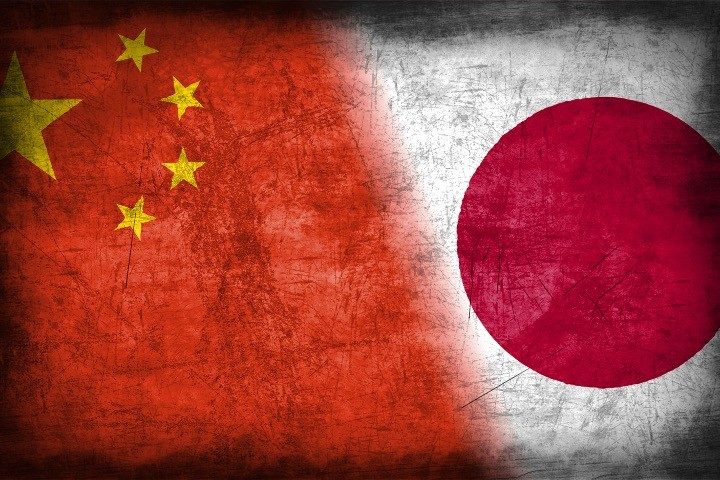
SINGAPORE — Amid escalating friction between Japan and China — as well as deteriorating public sentiment in Japan toward its larger neighbor — Japanese lawmakers are increasingly cautious about being regarded as “pro-China” politicians.
“Whatever the concerns may be, neighboring countries cannot move house,” Liberal Democratic Party (LDP) former Secretary-General Toshihiro Nikai commented at a Tokyo event held to commemorate the 50th anniversary of the normalization of Sino-Japanese diplomatic relations on September 29. “We must take a long view and not neglect efforts to cooperate with each other.”
Approximately 850 people participated in the September 29 event. Attendees included prominent members of the ruling and opposition parties, such as former Prime Minister Yasuo Fukuda and former House of Representatives Speaker Yohei Kono. For many years, both Fukuda and Kono acted as liaisons between the two countries.
LDP General Council Chairperson Toshiaki Endo, LDP Election Strategy Committee Chairman Hiroshi Moriyama, Komeito (conservative party) leader Natsuo Yamaguchi, and Constitutional Democratic Party of Japan leader Kenta Izumi were also present.
Government-to-government diplomacy between the two East Asian countries has hugely relied on diplomacy conducted by Japanese Diet members.
For example, in 2014, a group of Japanese lawmakers led by New Komeito lawmaker Kiyohiko Toyama concurred with Chinese Vice President Li Yuanchao that both countries need to enhance bilateral ties.
“At least three times, Vice President Li said that we should overlook minor disagreements for the sake of common interests. That’s important for Japan and China,” Toyama told a press conference in Beijing after their meeting.
That same year, a bipartisan delegation of senior Japanese lawmakers met Zhang Dejiang, the third-ranking member of China’s power hierarchy.
Zhang spoke with Masahiko Komura, a former foreign minister who also was the vice president of Japan’s ruling Liberal Democratic Party, based on footage from China Central Television.
Zhang’s meeting with Komura in 2014 signified the first meeting between a senior lawmaker from Japan’s ruling party and a member of China’s powerful seven-member Politburo Standing Committee since Shinzo Abe became prime minister in late 2012, according to Japan’s Kyodo news agency.
Then in 2015, Nikai met with President Xi Jinping in China with a delegation of about 3,000 in an effort to enhance bilateral relations, which had worsened after the nationalization of the Senkaku Islands in Okinawa Prefecture.
During another trip to China in 2019, Nikai attempted to garner support for a visit to Japan by Xi. However, the widely expected Chinese state visit was put off in April 2020 amid Covid-19 restrictions that hindered bilateral diplomacy.
Now, in 2022, Japan has witnessed a rise in Chinese bellicosity, including incursions into Japanese territorial waters around the Senkaku Islands. Such Chinese displays of pugilism have undermined diplomatic efforts by the two countries.
On the other hand, China has displayed its unhappiness over issues pertaining to Japan’s invasion and occupation of parts of the country in the 1930s and 1940s. Beijing gets especially irked when Japanese officials visit the controversial Tokyo-based Yasukuni Shrine, which commemorates millions of Japan’s war dead, including senior officials who were executed for war crimes.
Diet members with warm ties to China have been regarded as pro-China politicians, with some facing criticism. Thus, when Yoshimasa Hayashi became foreign minister in 2021, he resigned as chairman of the Japan-China Parliamentary Friendship Association to deflect such castigations.
Even Japan’s Komeito party, which has set up friendly relations with China, did not send a delegation to China amid Covid-19 restrictions, despite the party sending a delegation to China on an almost annual basis.
“Considering China’s current hegemonic stance, we have no choice but to keep our distance,” a Komeito source admitted.
The 1978 Japan-China Peace and Friendship Treaty clearly stated that neither of the nations “should seek hegemony in the Asia-Pacific region or in any other region,” Yamaguchi, the leader of Komeito, highlighted at a party meeting last week. “Political leaders of both countries must play their roles responsibly,” he said.
Many observers regarded continuous bilateral dialogue, such as lawmaker-level diplomacy, as crucial to avoid confrontations.
Others have advocated for having a multilayered pipeline that transcends government-to-government ties.
Fukuda, who was prime minister when a joint statement between the two nations was signed in 2008, said last Thursday, “It’s necessary to conduct a wide range of exchanges. Without dialogue, nothing will happen.”
Territorial disputes remain one of the major issues in the oft-tense relations between Japan and China. For instance, an uninhabited group of Tokyo-controlled, Beijing-claimed East China Sea islands called Senkaku in Japan and Diaoyu in China is one such hotbed of controversy. Japan claims the islands, which once hosted a Japanese seafood factory as part of its territory, both historically and by international law. China on the other hand asserts that these islands were stolen by Japan in 1895 and should have been returned to them following the end of the Second World War.
The situation is made even more complex as these disputed islands boast rich fishing grounds and undersea oil deposits. In light of these useful natural resources, Japan has accused China of abruptly making its territorial claims following the disclosure of the undersea resources in a 1969 report.
Although the 1972 normalization communique between the two countries omitted this contentious territorial issue, the dispute escalated after Japan’s government nationalized the Senkaku Islands in 2012, resulting in violent protests across China. Chinese coast guard and fishing boats have been subsequently spotted in the area, and are perceived by Japan to be violating Japanese waters.
Also, Tokyo has been irked by Chinese provocations around the Taiwan Strait in response to U.S. House Speaker Nancy Pelosi’s Taiwan visit in August 2022. Together with the United States, its security ally, Japan has openly condemned escalating Chinese activities near Taiwan.
As Japan’s westernmost island is just located east of Taiwan, “it is increasingly difficult to see how a Taiwan military contingency would not affect at a minimum the waters and airspace around Japanese territory,” admitted Amanda Hsiao, senior analyst for China at the Crisis Group.



